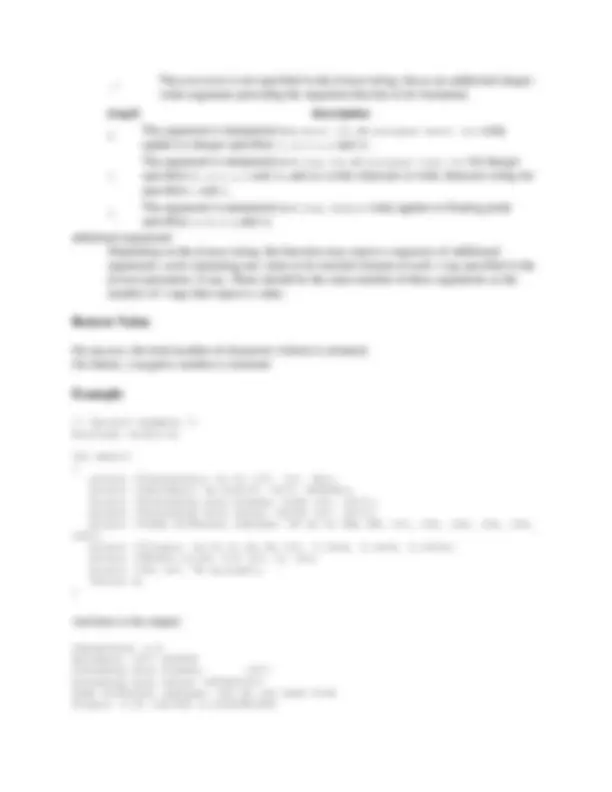




Study with the several resources on Docsity

Earn points by helping other students or get them with a premium plan


Prepare for your exams
Study with the several resources on Docsity

Earn points to download
Earn points by helping other students or get them with a premium plan
Community
Ask the community for help and clear up your study doubts
Discover the best universities in your country according to Docsity users
Free resources
Download our free guides on studying techniques, anxiety management strategies, and thesis advice from Docsity tutors
The c standard library printf function is used to write formatted data to the standard output (stdout). It accepts a format string and optional arguments that are formatted according to the specified tags in the format string. The function writes the formatted data to stdout and returns the number of characters written.
Typology: Assignments
1 / 4

This page cannot be seen from the preview
Don't miss anything!



int printf ( const char * format, ... );
Print formatted data to stdout
Writes to the standard output (stdout) a sequence of data formatted as the format argument
specifies. After the format parameter, the function expects at least as many additional arguments
as specified in format.
Parameters
format
String that contains the text to be written to stdout. It can optionally contain embedded format tags that are substituted by the values specified in subsequent argument(s) and formatted as requested. The number of arguments following the format parameters should at least be as much as the number of format tags. The format tags follow this prototype:
%[flags][width][.precision][length]specifier Where specifier is the most significant one and defines the type and the interpretation of the value of the coresponding argument: specifier Output Example c (^) Character a
d or i Signed decimal integer 392 e (^) Scientific notation (mantise/exponent) using e character 3.9265e+
E (^) Scientific notation (mantise/exponent) using E character 3.9265E+
f (^) Decimal floating point 392.
g (^) Use the shorter of %e or %f 392.
G (^) Use the shorter of %E or %f 392.
o (^) Signed octal 610
s (^) String of characters sample
u (^) Unsigned decimal integer 7235
x (^) Unsigned hexadecimal integer 7fa
X (^) Unsigned hexadecimal integer (capital letters) 7FA p (^) Pointer address B800:
n (^) Nothing printed. The argument must be a pointer to a signed int,
where the number of characters written so far is stored.
% (^) A % followed by another % character will write % to stdout.
The tag can also contain flags , width , .precision and modifiers sub-specifiers, which are
optional and follow these specifications:
flags description
Left-justify within the given field width; Right justification is the default (see width sub-specifier).
Forces to preceed the result with a plus or minus sign (+ or - ) even for positive numbers. By default, only negative numbers are preceded with a - sign.
(space) If no sign is going to be written, a blank space is inserted before the value.
Used with o, x or X specifiers the value is preceeded with 0 , 0x or 0X respectively for values different than zero. Used with e, E and f, it forces the written output to contain a decimal point even if no digits would follow. By default, if no digits follow, no decimal point is written. Used with g or G the result is the same as with e or E but trailing zeros are not removed.
Left-pads the number with zeroes ( 0 ) instead of spaces, where padding is specified (see width sub-specifier).
width description
(number)
Minimum number of characters to be printed. If the value to be printed is shorter than this number, the result is padded with blank spaces. The value is not truncated even if the result is larger.
.precision description
. number
For integer specifiers (d, i, o, u, x, X): precision specifies the minimum number of digits to be written. If the value to be written is shorter than this number, the result is padded with leading zeros. The value is not truncated even if the result is longer. A precision of 0 means that no character is written for the value 0. For e, E and f specifiers: this is the number of digits to be printed after the decimal point. For g and G specifiers: This is the maximum number of significant digits to be printed. For s: this is the maximum number of characters to be printed. By default all characters are printed until the ending null character is encountered. For c type: it has no effect. When no precision is specified, the default is 1. If the period is specified without an explicit value for precision , 0 is assumed.
Width trick: 10 A string
See also
puts Write string to stdout (function)
scanf Read formatted data from stdin (function)
fprintf Write formatted output to stream (function)
fwrite Write block of data to stream (function)